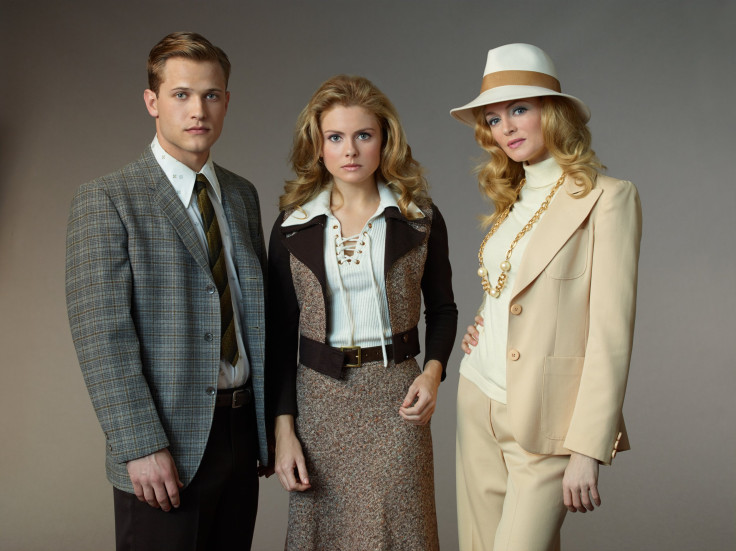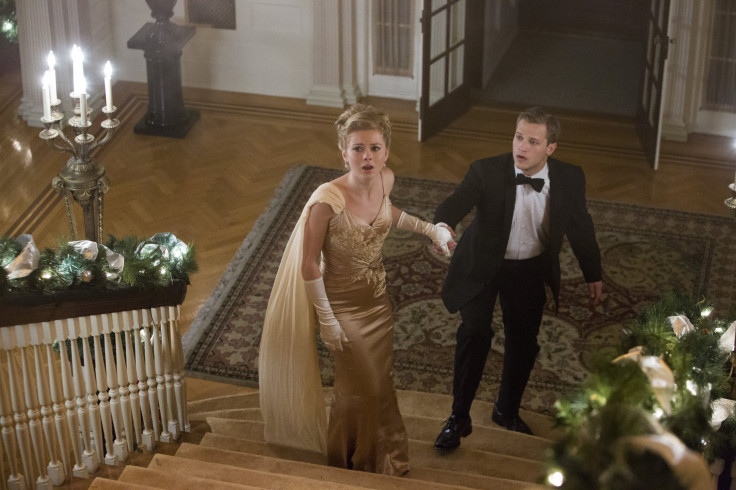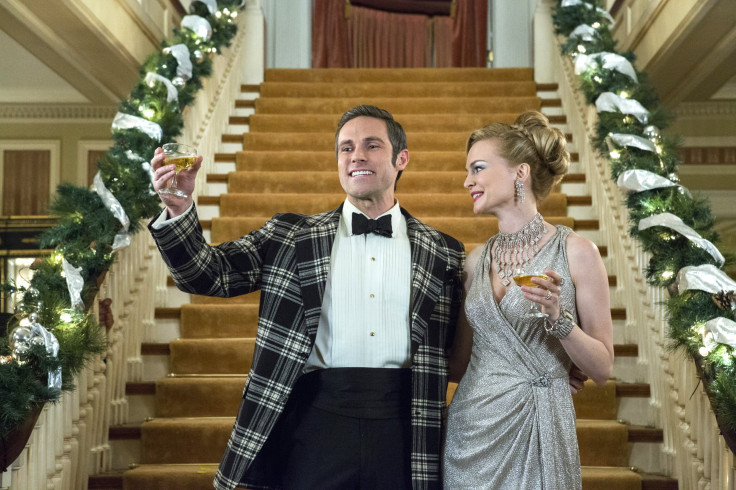‘Petals On The Wind’: Director Karen Moncrieff, Writer Kayla Alpert Discuss Lifetime’s VC Andrews Adaptation [Q&A]

It’s been more than 30 years since V.C. Andrews released the first Dollanganger book, but the series is as hot as ever. Lifetime’s adaptation of the “Flowers in the Attic” sequel, “Petals on the Wind,” drew 3.4 million viewers for its May 26 premiere, making it one of the network’s top four most-watched movies of the year.
International Business Times spoke separately with “Petals on the Wind” director Karen Moncrieff and teleplay writer Kayla Alpert, who discussed some of the steamy scenes in Lifetime's latest hit, and the criticism surrounding it:
IBTimes: Were you a fan of V.C. Andrews’ Dollanganger series?
Kayla Alpert: Yes! I loved this book as a tween. I spent many a late night sobbing over the dog-eared pages.
Karen Moncrieff: No. I have no idea what rock I was hanging out under, but somehow I missed the entire series!
IBTimes: “Flowers in the Attic” premiered in January. Four months later, Lifetime aired the sequel. Did you feel like “Petals on the Wind” was rushed? Do you believe the quick back-to-back timing was necessary?
Alpert: I had started writing the “Petals” screenplay just as we were going into production on “Flowers.” So even though there was only four months between the airings, there was more time put into it than most people realize. By the time Lifetime had announced the sequel at the TCA's in September, I'd already written a first draft. That said, it was definitely not the most "languid" schedule -- and we were all working our hardest to pull this sequel together as quickly as possible.
Moncrieff: The project was already underway and had an air date when I came onboard. Kayla was furiously writing the first draft. “Flowers” was about to air. And, while that was new for me – given that projects often languish in development for years – I was excited to jump onto a moving train!
IBTimes: “Flowers in the Attic” was turned into a movie in 1987 but was criticized for leaving out Cathy and Christopher’s sex scene and changing the ending. Did you take that into consideration when writing the script for both “Flowers in the Attic” and “Petals on the Wind”?
Alpert: With the first movie, “Flowers in the Attic,” we tried to stick closely to the book as possible. The original movie veered too far off from it- and missed the most essential, compelling and fun part of the book – the relationship between Cathy and Christopher. However, with “Petals,” the story is so epic and the tone is so crazy, I had to take a lot of liberties with the adaptation. With “Petals,” some people thought we included too much story; some people felt like we left out major characters (like Dr. Paul Sheffield), so you can't win them all! The most important decision we made in “Petals” was to stay true to the spirit of the book, and focus on the troubled relationship between Cathy and Christopher … and the residual struggles with their lives post-attic.

IBTimes: The scenes between Cathy and Christopher definitely got more intense and physical in “Petals.” Can you talk about the transition from the first film to the second?
Alpert: First of all, Kiernan Shipka was only 13 when we filmed “Flowers.” And truthfully, the book is less salacious than most people remember. What's salient in “Flowers” is their burgeoning sexuality, and follows first "baby" steps at this forbidden curiosity/interest in each other. By the time we meet them in “Petals,” they've both been around the block, as it were, and we could take their sexuality to the next level. In terms of tone of both the books and movies, “Flowers” is more of a horror story and “Petals” is more of a melodrama.
IBTimes: Despite the taboo of incest, many couldn’t help but root for Cathy and Christopher to have a happy ending together. Were you rooting for them as well?
Alpert: What's interesting about these two novels is that despite the incredibly taboo nature of Cathy and Christopher's relationship, you still manage to root for them. The ending of the book/movie is "happy" – the two lovers end up together – but at the same time, it's completely twisted. That's the fun and compelling aspect of V.C. Andrews' writing in a nutshell – and why I think so many love her books. As readers/viewers, we all feel like these characters are twisted and depraved – but then, we're equally "twisted" by rooting for them.
Moncrieff: Absolutely. It's one of the first things I said to the producers when I came on board. There was a lot of discussion about how in the book Cathy actually falls in love with Bart and is heartbroken when he dies in the fire. But I felt like where it came in our movie, it was hurting the real love story between Cathy and Christopher to play that. It also made Cathy seem fickle. Maybe if it had been a miniseries, you could gracefully move through all of those transitions, and she could fall in and out of love with three different people, but in 90 minutes, it just didn't work. We were galloping through plot points at a breakneck speed as it was. And so we reverse-engineered the story so that you would feel that pull of Cathy and Christopher's love all throughout the film.
After they sleep together that first time, they're never on the same page until the very end. Each time they come together, one of them is yearning to come together while the other one is somehow pulling away. They're never both emotionally free to engage at the same time. And so they each go through these periods of self-discovery and attempts at individuation – only to be inexorably drawn back together again. They're made for each other. I know it's immoral by societal standards, but I think that their love is beautiful and heartbreaking and understandable. As victims of a shared trauma, they found solace, comfort and love in each other.
IBTimes: Heather Graham’s interactions with Cathy, Christopher and Carrie were pretty cruel. I loved her locked up and crazy at the end. Can you talk about that scene?
Alpert: That was a really fun scene to shoot – and I'm an extra in the background as well. Heather really went for it! I think that's the most fitting punishment for Corrine – being locked up with a bunch of insane people – with nobody hearing her pleas for help, love.
Moncrieff: Heather really tapped into a deep emotional well in several of her scenes, including this one. I'm really proud of the work she did. I just pushed her really hard to go farther and deeper. The funny thing was, when we did ADR [additional dialogue recording], Heather had just seen a cut of the film and told me that while she had been afraid I was pushing her to go too "over the top," she actually felt she could have gone even farther. My job is always to push for more – more guts, more truth. I love watching actors dig deep and take emotional risks. I also really loved the moment Corinne asks her mother why she couldn't love her. Heather did some really beautiful work throughout that scene up in the bedroom.

IBTimes: One moment that Twitter seemed to have fun with was the shaving scene between Heather Graham and Dylan Bruce. Can you talk to me about that scene?
Alpert: That was the director Karen Moncrieff's idea. She wanted to show how extreme Corrine could be in order to keep her man – and keep up appearances – by using the one tool that always worked for her – her intense (and in this case, somewhat menacing) sexuality.
Moncrieff: Let me just say, that bathroom was pretty darn hot by the time we wrapped. It was the last scene we shot on our very first day of shooting. And we did a LOT of takes. I wanted Corinne to really claim her power and display a Lady Macbeth kind of ferocity we hadn't yet seen from her. So I pushed hard for that calculating, edge. And yes, sex scenes are always awkward, but Heather [Graham] and Dylan [Bruce] are both total pros. They were both really game to try my twisted ideas. And Tas Michos (the DP) and I worked hard to use the mirrors so you didn't actually see any naughty bits so we could pass muster with Standards & Practices. Even so we needed to recut the scene at the eleventh hour to be less suggestive. But I think it's still pretty clear what's happening. Our brilliant composer, Mario Grigorov, named his cue for that scene "Waxing Bart." I joke that Corinne's just giving Bart a very thorough hand washing.
IBTimes: Do you have a favorite part of the movie?
Alpert: Actually, I love the chemistry between Cathy and Julian, on stage and in bed. I also love the really emotional scenes between Cathy and Christopher. That kind of weepy, deeply felt romantic melodrama is so rare in TV or movies these days and I just gobble it up. I also love the Carrie story – I wish I could do an entire TV series set at that girls' school!
And of course, I love Ellen Burstyn [who played Olivia Foxworth] especially the scene with Rose [McIver]. The line "You can leave this house but you'll never escape this family" is my favorite – and pretty much sums up the entire movie/book series. Frankly, it's true for everyone. Luckily, most of our families aren't quite that bonkers.
Moncrieff: I have so many. I really love the scene with Cathy and Olivia in the bedroom in which Cathy confronts her grandmother about the abuse and killing Cory. I thought both Ellen [Burstyn] and Rose [McIver] did a beautiful job bringing that scene to life. I also loved Carrie's scene in which she asks her brother if he thinks she's pretty. And I thought Will Kemp was so sexy and human and surprisingly vulnerable in the scene in which he apologizes to Cathy for hitting her. And Dylan Bruce's reaction to seeing Cathy on the stairs at the Christmas party amazes me. And there are others. I really thought the actors in this cast were fantastic and I loved working with every one of them.
IBTimes: A majority of viewers seemed to love “Petals on the Wind.” What do you have to say to those upset over the changes from the novel?
Moncrieff: I tell myself I understand. When you love a book so deeply, it's very hard to see it tampered with. And unfortunately, to make this epic book into a 90-minute mainstream movie that could hold together for fans and newbies alike, some pretty significant changes were necessary. But I wish the faithful could understand that nothing was done thoughtlessly or in a cavalier manner. I can attest to the fact that Kayla, Lisa [Hamilton Daly], Michele [Weiss] and Merideth [Finn] all took great pains to preserve the emotional intent and spirit of the books.
IBTimes: Will you be returning for the third Dollanganger Lifetime adaptation, “If There Be Thorns”?
Alpert: I was too busy working on “Petals” to adapt "If There Be Thorns." But I have a few more tricks up my sleeve. Stay tuned!
Moncrieff: There are different producers involved with that one, so I'm guessing they'll want to choose their own team. But I'd certainly be open to it. Directing "Petals" has been a really wonderful experience for me creatively. Despite our ambitious script and crazy (18-day) shooting schedule, we all strove to make the most artful, beautiful, feature-worthy version of this story that we could. And of course there are things that I wish were better, but I'm really, really proud of what we accomplished!
© Copyright IBTimes 2024. All rights reserved.












